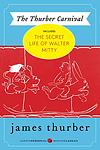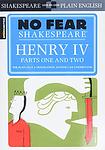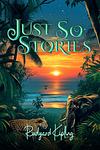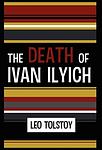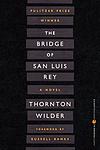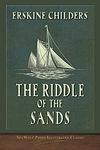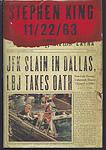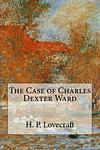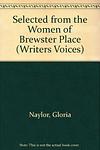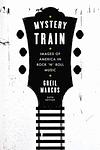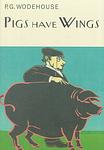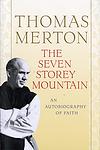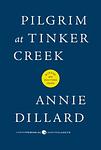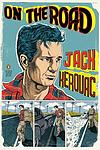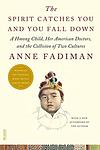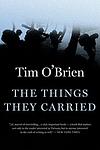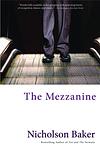1,000 Books to Read Before You Die: A Life-Changing List
This is one of the 305 lists we use to generate our main The Greatest Books list.
-
Eloise by Kay Thompson
"Eloise" is a delightful children's book that follows the adventures of a precocious six-year-old girl who lives in the Plaza Hotel in New York City. With a rich imagination and a wild spirit, Eloise has a penchant for mischief and mayhem, navigating the grand hotel with her pug dog, Weenie, and her turtle, Skipperdee. Under the nominal supervision of her often-absent mother and her caring nanny, Eloise explores the ins and outs of hotel living, charming and sometimes exasperating the staff and guests with her antics and adventures. The story captures the whimsy and chaos of childhood through the eyes of its uniquely spirited protagonist.
The 8726th Greatest Book of All Time -
The Thurber Carnival by James Thurber
"The Thurber Carnival" is a delightful anthology that showcases the wit, humor, and imagination of its author, featuring a collection of essays, short stories, and cartoons. This compilation includes some of his most beloved works, offering a satirical look at everyday life and the human condition. The author's unique blend of humor and insight, often focusing on the quirks and absurdities of both people and animals, makes this book a timeless classic, appealing to readers who appreciate a sharp, whimsical critique of social norms and personal foibles.
The 8726th Greatest Book of All Time -
Angels In America by Tony Kushner
The play is a profound and complex exploration of the AIDS crisis in the 1980s, intertwining the lives of several characters grappling with their sexuality, religion, and politics. Set against the backdrop of a conservative Reagan-era America, it delves into themes of abandonment, race, and the supernatural, as characters confront personal and societal challenges. The narrative weaves together the stories of a gay man diagnosed with AIDS, his closeted and conflicted lover, a Mormon couple facing their own crises, and a notorious real-life lawyer, Roy Cohn, also battling AIDS. Ethereal beings, including a heralding angel, intersect with the characters' lives, adding a fantastical dimension to the play's commentary on human suffering, redemption, and the quest for justice and love.
The 1883rd Greatest Book of All Time -
Who's Afraid Of Virginia Woolf? by Edward Albee
The play is a darkly comedic exploration of the complexities of marriage and personal disillusionment. Set over the course of a single evening, it follows an older couple, George and Martha, who, after a faculty party, invite a younger couple, Nick and Honey, to their home for late-night drinks. As the night progresses, George and Martha engage in increasingly vicious verbal battles in front of their guests, using them as pawns in their psychological warfare. The play delves into themes of reality versus illusion, as the characters' secrets and personal failures are exposed, revealing the deep-seated unhappiness and dysfunction at the heart of their relationships.
The 3053rd Greatest Book of All Time -
The Fatal Shore by Robert Hughes
"The Fatal Shore" provides an expansive and detailed historical account of the colonization of Australia by the British Empire, focusing particularly on the transportation of convicts to the penal colonies established there in the 18th and 19th centuries. The book delves into the harsh realities and brutal conditions faced by the convicts, as well as the broader social, political, and economic ramifications of establishing a colony on the other side of the world. Through compelling narratives and meticulous research, it explores the transformation of Australia from a penal colony to a nation, examining the impact on both the indigenous populations and the settlers.
The 5800th Greatest Book of All Time -
Goodbye, Mr. Chips by James Hilton
The novel tells the story of Mr. Chipping, a beloved schoolteacher who dedicates his entire adult life to teaching at an all-boys English boarding school. Known affectionately as Mr. Chips, the gentle and kind-hearted teacher influences many generations of boys with his wisdom and human compassion. Through his eyes, readers experience the changes in British society and the world from the late 19th century through the early 20th century, including the impact of World War I. Mr. Chips, despite personal loss and the world's evolving landscape, remains a steadfast figure of nostalgia and idealism in the lives of his students.
The 5517th Greatest Book of All Time -
Andersonville by MacKinlay Kantor
"Andersonville" is a historical novel set during the American Civil War, focusing on the Confederate prisoner-of-war camp, Andersonville prison. The narrative vividly portrays the horrific conditions and experiences of the Union soldiers held captive there. It delves into the lives of the prisoners, their captors, and the surrounding civilian population, providing a comprehensive and brutal depiction of one of the most notorious chapters in American history.
The 1147th Greatest Book of All Time -
Kidnapped by Robert Louis Stevenson
This adventure novel follows the journey of a young Scottish man, David Balfour, who is tricked by his uncle and sold into slavery. After being shipwrecked, he partners with a Jacobite rebel, Alan Breck Stewart, and they journey across the Scottish Highlands, evading authorities and battling foes. Throughout the narrative, themes of justice, friendship, and courage are explored, set against the backdrop of 18th-century Scottish politics.
The 1033rd Greatest Book of All Time -
I Know Why the Caged Bird Sings by Maya Angelou
This memoir recounts the early years of an African-American girl's life, focusing on her experiences with racism and trauma in the South during the 1930s. Despite the hardships she faces, including sexual abuse, she learns to rise above her circumstances through strength of character and a love of literature. Her journey from victim to survivor and her transformation into a young woman who respects herself is a testament to the human capacity to overcome adversity.
The 156th Greatest Book of All Time -
To the Lighthouse by Virginia Woolf
This novel is a pioneering work of modernist literature that explores the Ramsay family's experiences at their summer home on the Isle of Skye in Scotland. The narrative is divided into three sections, focusing on a day in the family's life, a description of the house during their absence, and their return after ten years. The book is known for its stream of consciousness narrative technique and its exploration of topics such as the passage of time, the nature of art, and the female experience.
The 35th Greatest Book of All Time -
Guys And Dolls by Damon Runyon
"Guys and Dolls" is a collection of short stories that vividly captures the bustling world of 1920s and 1930s New York City, focusing on the colorful characters of Broadway's underground gambling scene. The narrative is rich with the slang and vernacular of the time, bringing to life the gamblers, hustlers, and showgirls who inhabit this vibrant yet shadowy world. Through a series of witty, poignant, and humorous tales, the book explores themes of luck, deception, and love, offering a unique and enduring portrayal of American urban life during the early 20th century.
The 8726th Greatest Book of All Time -
Doctor Zhivago by Boris Pasternak
Set against the tumultuous backdrop of the Russian Revolution, the book follows the life of a physician and poet, Yuri Zhivago, as he navigates the political and social upheaval of the early 20th century. Torn between his love for two women, his wife Tonya and his passionate mistress Lara, Zhivago's personal struggles mirror the larger societal changes occurring around him. The novel explores themes of love, war, and the human spirit, offering a poignant and complex portrait of life during a time of revolutionary change.
The 129th Greatest Book of All Time -
The Stories of John Cheever by John Cheever
This collection of short stories provides an intimate look into the lives of individuals living in the American suburbs during the mid-20th century. The narratives often center around themes of love, loss, and the pursuit of the American dream, painting a vivid picture of the human condition. The characters are typically middle-class individuals dealing with personal crises, existential dread, and the often harsh realities of everyday life. The stories are renowned for their ability to capture the essence of post-war America, with all of its beauty, despair, and complexity.
The 291st Greatest Book of All Time -
Nicholas And Alexandra by Robert K. Massie
The book provides a detailed account of the last Tsar of Russia, Nicholas II, and his wife, Alexandra, exploring their private lives, the political turmoil, and the social upheavals that enveloped their reign. It delves into their personal relationship, their handling of the Russian Empire's vast complexities, their tragic connection with the mystic Rasputin, and their eventual downfall during the Russian Revolution. The narrative not only captures the grandeur and tragedy of their era but also offers intimate insights into the lives of the imperial family, culminating in their poignant and harrowing end.
The 8726th Greatest Book of All Time -
Betsy Tacy by Maud Hart Lovelace
The book follows the adventures of two young girls, Betsy and Tacy, who meet on Betsy's fifth birthday and become inseparable friends. Set in the early 1900s in the small town of Deep Valley, Minnesota, the story captures the whimsical and heartfelt moments of childhood as the pair navigates the joys and sorrows of growing up. Through their imaginative play and exploration, Betsy and Tacy's friendship blossoms, illustrating the enduring power of friendship and the beauty of a simple, happy childhood.
The 8726th Greatest Book of All Time -
Oedipus the King by Sophocles
"Oedipus the King" is a tragic play that revolves around the life of Oedipus, the king of Thebes, who is prophesied to kill his father and marry his mother. Despite his attempts to avoid this fate, Oedipus unknowingly fulfills the prophecy. When he discovers the truth about his actions, he blinds himself in despair. The play explores themes of fate, free will, and the quest for truth, highlighting the tragic consequences of human hubris and ignorance.
The 80th Greatest Book of All Time -
The Bourne Identity by Robert Ludlum
In this gripping espionage thriller, a man is found adrift in the Mediterranean Sea with no memory of his identity but with an array of extraordinary skills that suggest a dangerous past. As he embarks on a desperate quest to discover his true identity, he learns that he is known as Jason Bourne and is pursued by assassins and government agents. Tangled in a web of covert operations, Bourne must outmaneuver his enemies while piecing together fragments of his past, which lead him to confront a global conspiracy and the realization that he was once a highly skilled operative.
The 1553rd Greatest Book of All Time -
Invisible Cities by Italo Calvino
In this unique novel, a Venetian traveler describes 55 different cities to the Mongol emperor, each city more fantastical and surreal than the last. The cities are divided into categories such as "Cities and Memory," "Cities and Desire," "Cities and Signs," etc. As the traveler continues to describe these cities, it becomes clear that they are all actually the same city, Venice, seen from different perspectives and points in time. The novel explores themes of memory, perception, and the nature of human experience.
The 293rd Greatest Book of All Time -
A Hole Is To Dig by Ruth Krauss
"A Hole Is to Dig" is a charming children's book that playfully explores the concept of purpose through simple, whimsical definitions of everyday things from a child's perspective. The book pairs delightful illustrations with brief, imaginative phrases that define objects and actions in a way that resonates with young readers, such as "a hole is to dig" or "hands are to hold." This creative exploration encourages children to think about the world around them in a playful, thoughtful way, making it a timeless classic for early learning and imagination.
The 8726th Greatest Book of All Time -
The Life and Opinions of Tristram Shandy, Gentleman by Laurence Sterne
The novel is a humorous, rambling narrative that chronicles the life of Tristram Shandy. The story is filled with digressions, anecdotes, and eccentric characters, as Tristram often interrupts his own tale to interject commentary or to recount stories from his family's past. Despite the seemingly haphazard structure, the novel is a clever exploration of narrative form and a satirical critique of traditional biographies and novels.
The 59th Greatest Book of All Time -
The Leopard by Giuseppe Tomasi di Lampedusa
"The Leopard" is a historical novel set in 19th-century Sicily, during the time of the Italian unification or Risorgimento. It centers on an aging, aristocratic protagonist who is coming to terms with the decline of his class and the rise of a new social order. The narrative weaves together personal drama with the larger political and social upheaval of the time, providing a rich, nuanced portrait of a society in transition. Despite his resistance to change, the protagonist ultimately recognizes its inevitability and the futility of his efforts to preserve the old ways.
The 97th Greatest Book of All Time -
Henry IV, Part I by William Shakespeare
This classic play revolves around the life of King Henry IV, his son Prince Hal, and their turbulent kingdom. The kingdom is in chaos due to rebellions, and the king is disappointed with his son's irresponsible behavior. The prince, however, spends his time in taverns with the amusing and deceitful Falstaff. As the rebellion against the king grows, Prince Hal shows his true potential and bravery by not only saving his father in battle but also killing the leader of the rebellion, proving himself to be a worthy heir to the throne.
The 1905th Greatest Book of All Time -
Dangerous Liaison by Pierre Choderlos de Laclos
"Dangerous Liaison" is a tale of manipulation, revenge, and seduction set in the French aristocracy before the French Revolution. The novel follows the Marquise de Merteuil and the Vicomte de Valmont, two rivals who use sex as a weapon to humiliate and degrade others, all the while enjoying their cruel games. Their targets are the virtuous (and married) Madame de Tourvel and the young Cecile de Volanges. The book is a dramatic exploration of decadence, corruption, and ultimate retribution.
The 211th Greatest Book of All Time -
Henry Iv Parts Two by William Shakespeare
The play continues the story of a monarch struggling to maintain his grip on the throne amidst rebellion and internal strife. As the king's health wanes, his son and heir, Prince Hal, must navigate the treacherous political landscape, shedding his wayward past and proving himself a worthy successor. The narrative juxtaposes the prince's maturation with the comic exploits of Sir John Falstaff, Hal's boisterous and disreputable companion. Themes of honor, power, and the burdens of leadership are explored as the characters confront their destinies and the looming inevitability of change.
The 8451st Greatest Book of All Time -
Lucky Jim by Kingsley Amis
"Lucky Jim" is a comic novel that follows the life of Jim Dixon, a young and disillusioned lecturer at a provincial British university. Struggling with his job and his pretentious boss, Dixon navigates through a series of humorous and often absurd situations, including a disastrous public lecture and a chaotic weekend at his boss's house. The novel satirizes the snobbishness and hypocrisy of the academic world, and explores themes of class, ambition, and the struggle to find personal authenticity in a conformist society.
The 238th Greatest Book of All Time -
Dinner at the Homesick Restaurant by Anne Tyler
"Dinner at the Homesick Restaurant" is a novel about the life of the Tull family, which is marked by abandonment and discord, but also love and resilience. The story is told from the perspective of each family member, providing a unique viewpoint on the family's dynamics and history. The matriarch, Pearl, struggles to raise her three children, Cody, Ezra, and Jenny, after their father abandons them. Each child deals with the abandonment and their dysfunctional family in different ways, shaping their adult lives. The novel explores themes of family, love, abandonment, and the idea of home.
The 761st Greatest Book of All Time -
84, Charing Cross Road by Helene Hanff
This book is a charming collection of letters exchanged over two decades between a spirited New York writer and the staff of a quaint, antiquarian bookshop in London. Through their correspondence, which begins as a straightforward request for obscure classics and British literature, a deep and affectionate relationship blossoms, not only between the writer and the bookshop's employees but also involving their families and friends. Despite never meeting in person, the letters reveal a profound connection that transcends the Atlantic, bound by a shared love for books and the written word, offering a heartwarming testament to the enduring power of friendship.
The 3398th Greatest Book of All Time -
A Year in Provence by Peter Mayle
"A Year in Provence" is a humorous and engaging memoir that chronicles a year in the life of a British couple who move to Provence, France. The book captures the charm and quirks of rural French life, as the couple adapt to their new home, navigate through the French bureaucracy, deal with local tradesmen, and savor the local cuisine and wines. The changing seasons and local customs are vividly described, providing a delightful and insightful view of life in Provence.
The 5484th Greatest Book of All Time -
The Interpretation of Dreams by Sigmund Freud
This groundbreaking work explores the theory that dreams are a reflection of the unconscious mind and a means of understanding our deepest desires, anxieties, and fantasies. The book delves into the symbolism of dreams and their connection to repressed thoughts and experiences, proposing that they are a form of wish fulfillment. The author also introduces the concept of "dream work," which transforms these unconscious thoughts into the content of dreams, and discusses various methods of dream interpretation.
The 143rd Greatest Book of All Time -
Twenty Thousand Leagues Under the Sea by Jules Verne
This classic science fiction novel follows the adventures of Professor Aronnax, his servant Conseil, and harpooner Ned Land as they are captured by the enigmatic Captain Nemo aboard the Nautilus, a technologically advanced submarine. As they journey 20,000 leagues under the sea, they encounter a variety of sea creatures and underwater phenomena. The narrative explores themes of exploration, scientific discovery, and man's relationship with nature.
The 274th Greatest Book of All Time -
My Family And Other Animals by Gerald Durrell
In this humorous and heartwarming memoir, a young boy named Gerald Durrell recounts his unconventional upbringing on the idyllic Greek island of Corfu. Surrounded by a colorful cast of eccentric family members and a menagerie of unique animals, Gerald's adventures and misadventures bring joy and laughter to readers as he navigates the wonders of nature and the challenges of growing up. With vivid descriptions and witty anecdotes, this book is a delightful tribute to the beauty of the natural world and the bonds of family.
The 766th Greatest Book of All Time -
Travels by Marco Polo
This book is a detailed account of a Venetian merchant's extensive travels throughout Asia during the 13th century. The narrative provides a comprehensive exploration of the diverse cultures, customs, landscapes, wildlife, and wealth of the Eastern world, including the Mongol Empire and China, where the author spent time in the court of Kublai Khan. His descriptions of the grandeur and sophistication of these civilizations challenged European assumptions about the East, and his tales of exotic wonders and adventures continue to captivate readers today.
The 2364th Greatest Book of All Time -
Just So Stories by Rudyard Kipling
"Just So Stories" is a collection of whimsical tales that explain the origins of various animal characteristics in a playful and imaginative manner. Each story is a fantastical fable, providing fanciful explanations for why animals look or behave as they do, such as how the leopard got its spots or the camel its hump. Written with a lyrical and rhythmic quality, the stories are intended for children but also captivate adult readers with their wit and inventiveness. The book blends elements of folklore and fantasy, offering moral lessons and insights into human nature through its charming narratives.
The 8726th Greatest Book of All Time -
Father Goriot by Honoré de Balzac
"Father Goriot" is a classic French novel that explores the themes of wealth, power, love, and social status in 19th century Paris. The narrative follows the lives of three main characters: a young, ambitious law student who seeks to rise above his modest background; an elderly, once-wealthy man who has sacrificed everything for his two ungrateful daughters; and a crafty, ruthless criminal who manipulates others for his own gain. Their stories intertwine in a boarding house, revealing the harsh realities of Parisian society and the destructive power of unchecked ambition and selfishness.
The 207th Greatest Book of All Time -
Night by Elie Wiesel
This book is a memoir of the author's experiences during the Holocaust, specifically in the Auschwitz and Buchenwald concentration camps. The narrative focuses on the relationship between a father and son under the most extreme circumstances, the loss of faith in God, humanity, and in each other, and the horrifying reality of the systematic genocide of six million Jews during World War II. The book is a poignant and stark examination of the depths of human evil and the enduring power of hope and survival.
The 635th Greatest Book of All Time -
Angle of Repose by Wallace Stegner
This novel follows the story of a retired historian, wheelchair-bound due to a degenerative disease, as he explores the lives of his pioneering grandparents in the late 19th and early 20th century American West. Through letters, he pieces together their struggles, triumphs, and the impact of their relationship on their surroundings. The historian parallels his own life and failed marriage with that of his grandparents, leading to a deep exploration of the concepts of stability, perseverance, and the "angle of repose."
The 884th Greatest Book of All Time -
The Emperor of All Maladies: A Biography of Cancer by Siddhartha Mukherjee
This book is a comprehensive history of cancer, its treatments, and the ongoing search for a cure. It presents an in-depth exploration of the disease from its first documented appearances thousands of years ago through the epic battles in the twentieth century to cure, control, and conquer it, to a radical new understanding of its essence. The book also discusses the politics of cancer research, the impact of patient activism, and the complex and often fraught relationships between researchers, oncologists, and patients.
The 1942nd Greatest Book of All Time -
The Death of Ivan Ilyich by Leo Tolstoy
The book is a poignant exploration of mortality and the human condition, focusing on a high-court judge in 19th-century Russia who lives a seemingly successful and conventional life. However, when he is confronted with a terminal illness, he begins to question the meaning and value of his life, leading to an existential crisis and eventual spiritual awakening. Through his struggle, he comes to realize the superficiality of his previous life and the importance of genuine human connection. His story is a profound commentary on the nature of life, death, and the pursuit of happiness.
The 400th Greatest Book of All Time -
Wittgenstein Jr. by Lars Iyer
The novel follows a group of Cambridge philosophy students under the guidance of their enigmatic and often perplexing lecturer, whom they nickname Wittgenstein Jr due to his philosophical intensity and resemblance to the famous philosopher. Throughout the academic year, the students grapple with their own intellectual and existential crises while being drawn into their lecturer's personal quest to forge a philosophical path that both honors and challenges the legacy of his namesake. The narrative weaves together themes of youth, academia, and the struggle for meaning in a style that is both humorous and deeply reflective.
The 10398th Greatest Book of All Time -
The Glass Bead Game by Hermann Hesse
Set in the 23rd century, the novel revolves around a highly intellectual game, the Glass Bead Game, which incorporates all fields of human and cosmic knowledge. The story follows the life of Joseph Knecht, a scholar who becomes a Magister Ludi (Master of the Game). The book explores his life and thoughts, including his relationships with others and his questioning of the values of his society. The narrative is a profound exploration of human life, knowledge, and spirituality.
The 450th Greatest Book of All Time -
Fer De Lance by Rex Stout
In "Fer-de-Lance," readers are introduced to a brilliant, orchid-loving detective and his astute assistant as they embark on their first case together. The story revolves around the mysterious death of a college president, initially believed to be an accident. However, as the detective duo delves deeper, they uncover a sinister plot involving a uniquely deadly weapon, leading them into a world of danger and intrigue. Their investigation reveals hidden motives and a cunning murderer, showcasing their deductive prowess and setting the stage for future adventures.
The 8726th Greatest Book of All Time -
Presumed Innocent by Scott Turow
A gripping legal thriller, this novel follows the story of a chief deputy prosecutor who finds himself accused of the brutal murder of his colleague, with whom he had a passionate extramarital affair. As the evidence against him mounts, he struggles to prove his innocence while uncovering corruption and deceit within the very system he once served. The story is a riveting exploration of the complexities of the legal system, human nature, and the concept of presumed innocence.
The 996th Greatest Book of All Time -
The Great Railway Bazaar by Paul Theroux
"The Great Railway Bazaar" is a travelogue in which the author embarks on a four-month journey by train from London through Europe, the Middle East, the Indian subcontinent, Southeast Asia, and Siberia, and then back to Europe. The book is a vivid and insightful account of the people, cultures, landscapes, and experiences encountered during the journey, painting a unique picture of the world as seen from the perspective of a train window. The author's sharp observations and engaging storytelling make this journey as much an inner exploration as a geographical one.
The 1049th Greatest Book of All Time -
War and Peace by Leo Tolstoy
Set in the backdrop of the Napoleonic era, the novel presents a panorama of Russian society and its descent into the chaos of war. It follows the interconnected lives of five aristocratic families, their struggles, romances, and personal journeys through the tumultuous period of history. The narrative explores themes of love, war, and the meaning of life, as it weaves together historical events with the personal stories of its characters.
The 16th Greatest Book of All Time -
True History of the Kelly Gang by Peter Carey
This historical novel is a fictionalized account of the life of Australian outlaw Ned Kelly, told in the form of a journal written to his daughter. The narrative explores Kelly's life from childhood, his family's struggles with poverty and the law, his involvement in horse thievery, and his eventual formation of the Kelly Gang. The story culminates with the gang's infamous standoff with the police at Glenrowan, providing a humanizing perspective on a figure often portrayed as a ruthless criminal.
The 960th Greatest Book of All Time -
A Lesson Before Dying by Ernest J. Gaines
Set in the pre-Civil Rights South, the novel explores the story of a young black man wrongfully accused and sentenced to death for a crime he didn't commit. A local schoolteacher, at the request of the man's godmother, attempts to help the condemned man gain a sense of dignity and self-worth in the final days of his life. The story grapples with issues of racial inequality, justice, humanity, and moral obligation.
The 1336th Greatest Book of All Time -
Good-Bye to All That by Robert Graves
This memoir provides a candid and unflinching look at the horrors of World War I, as experienced by a young British officer. The narrative explores the brutality and futility of war, the author's struggle with shell shock, his disillusionment with the military and British society, and his decision to leave England for a new life abroad. It also offers insights into the author's personal life, including his troubled marriage and his relationships with other prominent figures of the time.
The 627th Greatest Book of All Time -
The Day of the Triffids by John Wyndham
In this post-apocalyptic novel, the majority of the world's population is blinded by a comet shower, leaving society vulnerable to the Triffids - venomous, mobile plants that were previously farmed for their oil. The protagonist, who retains his sight after being hospitalized during the comet shower, must navigate this new world, dealing with the Triffids and the desperate remnants of humanity. The novel explores themes of survival, adaptation, and the inherent fragility of civilization.
The 621st Greatest Book of All Time -
The Bridge of San Luis Rey by Thornton Wilder
"The Bridge of San Luis Rey" is a novel that explores the nature of love and the meaning of life, set in 18th century Peru. The narrative revolves around a tragic incident where five people die when a rope bridge collapses. A Franciscan monk, who witnesses the accident, embarks on a quest to find out why these particular people had to die, hoping to prove that it was divine intervention. The book delves into the lives of the victims, revealing their personal stories, their hopes, dreams, and disappointments, as the monk attempts to decipher the cosmic significance of this tragedy.
The 862nd Greatest Book of All Time -
The Panda's Thumb by Stephen Jay Gould
"The Panda's Thumb" is a collection of essays that delve into the peculiarities and wonders of natural history, emphasizing the concept of evolution through natural selection. The book explores a range of topics, from the title essay which discusses the evolutionary function of the giant panda's unique thumb as a specialized adaptation, to broader themes involving the imperfections that characterize evolutionary processes. The author uses these discussions to argue against the notion of a perfectly created world, instead presenting a perspective of life as a series of historical contingencies that produce the diverse and sometimes bizarre organisms observed in nature.
The 9171st Greatest Book of All Time -
The Golden Notebook by Doris Lessing
The novel centers around a woman named Anna Wulf, a writer who keeps four notebooks, each representing a different aspect of her life: her experiences in Africa, her current life in London, a novel she is writing, and her personal experiences. As Anna's mental state deteriorates, she attempts to unify her fragmented self in a fifth notebook, the golden notebook. The novel explores themes of mental breakdown, communism, the changing role of women, and the fear of nuclear war.
The 94th Greatest Book of All Time -
Riddle of the Sands by Erskine Childers
This novel is a classic early 20th-century spy thriller that follows two British yachtsmen who stumble upon a German plot to invade England while on a sailing trip in the North Sea. The duo must use their wits and sailing skills to outmaneuver the Germans and alert the British government of the impending attack. The book is notable for its attention to detail and realism, particularly in its descriptions of sailing and the North Sea coastline.
The 759th Greatest Book of All Time -
The Book of Job by Unknown
"The Book of Job" is a profound biblical narrative that explores the themes of faith, suffering, and divine justice. It tells the story of Job, a prosperous and righteous man who experiences immense suffering as he loses his wealth, children, and health. Despite his trials, Job maintains his faith in God, engaging in intense dialogues about human suffering and divine justice. The story concludes with God restoring Job's fortunes and blessing him more abundantly than before, demonstrating the inscrutable nature of divine wisdom and the rewards of unwavering faith.
The 1164th Greatest Book of All Time -
A House for Mr. Biswas by V. S. Naipaul
The novel narrates the life of Mr. Biswas, a man of Indian descent living in Trinidad, who struggles against poverty and adversity to achieve personal independence and to build a home for himself and his family. Born into a poor family and married into an oppressive one, he constantly strives for autonomy and identity against the backdrop of post-colonial Trinidad. His dream of owning his own house becomes a symbol of his desire for self-determination and respect in a society that often denies him both.
The 204th Greatest Book of All Time -
11 22 63 by Stephen King
"11/22/63" is a science fiction novel by Stephen King that follows the story of Jake Epping, a high school English teacher who discovers a portal that leads to 1958. After being convinced by his friend Al to use the portal to prevent the assassination of John F. Kennedy, Jake embarks on a journey through time to change the course of history. Along the way, he falls in love with a woman named Sadie and faces various obstacles that threaten to alter the timeline he is trying to change. The book explores themes of love, loss, and the consequences of trying to change the past.
The 2430th Greatest Book of All Time -
The Case Of Charles Dexter Ward by H. P. Lovecraft
In this chilling tale, a young man named Charles Dexter Ward becomes obsessed with his mysterious ancestor, Joseph Curwen, who dabbled in alchemy and necromancy in the 18th century. As Ward delves deeper into his ancestor's dark past, he uncovers horrifying secrets that lead to his own involvement in arcane and dangerous practices. His investigation causes alarming changes in his behavior, prompting a desperate response from those around him as they try to halt a rising evil. The story blends elements of gothic horror and historical mystery, creating a disturbing exploration of obsession and the supernatural.
The 8726th Greatest Book of All Time -
The Boys Of Summer by Roger Kahn
"The Boys of Summer" is a nostalgic and evocative account of the Brooklyn Dodgers in the 1950s, a team that captured the hearts of its fans with its remarkable talent and tumultuous history. The book intertwines the author's personal experiences and memories of growing up in Brooklyn with profiles of the team's most iconic players. It explores the impact of baseball on both the players and their fans, capturing the bittersweet changes and enduring spirit of the era. The narrative not only celebrates the triumphs on the field but also delves into the players' lives after their baseball careers, offering a poignant look at their challenges and successes in the years that followed.
The 8726th Greatest Book of All Time -
Attis And Other Poems by Catullus
"Attis and Other Poems" is a collection of lyrical works that delve into themes of love, desire, and personal anguish. The poems are characterized by their emotional intensity and vivid imagery, often reflecting the poet's own tumultuous love affairs and inner turmoil. The titular poem, "Attis," stands out with its mythological narrative and exploration of themes such as identity and transformation. Throughout the collection, the poet's mastery of language and form is evident, as he skillfully weaves together personal experiences with broader reflections on human nature and the complexities of the human heart.
The 2898th Greatest Book of All Time -
Life & Times of Michael K by J M Coetzee
Set in South Africa during a civil war, the novel follows the journey of Michael K, a simple gardener with a cleft lip. When his mother falls ill, he attempts to take her back to her rural birthplace. After she dies en route, Michael continues the journey alone, struggling to survive in a war-torn landscape, while also being caught up in the bureaucratic red tape of the dystopian society. The story explores themes of freedom, survival, and the human spirit's resilience against adversity.
The 836th Greatest Book of All Time -
The Deptford Trilogy by Robertson Davies
"The Deptford Trilogy" is a series of interconnected novels that explore the life of a man from a small Canadian town named Deptford, and the ripple effects of a single childhood event that shaped the lives of three boys. The narrative weaves themes of love, guilt, art, and the complexity of human nature. The story is told from multiple perspectives and spans several decades, providing a deep exploration of the characters' psychological and spiritual development.
The 1179th Greatest Book of All Time -
Gargantua and Pantagruel by Francois Rabelais
"Gargantua and Pantagruel" is a satirical and humorous tale of two giants, Gargantua and his son Pantagruel. The narrative is filled with bawdy humor, wordplay, and grotesque and exaggerated characters, reflecting the realities of 16th-century France. The book is also known for its profound insights on education, religion, and politics, often criticizing the corruption and hypocrisy of the powerful. The novel is a rich blend of fantasy, comedy, and philosophical discourse, making it a classic of Renaissance literature.
The 201st Greatest Book of All Time -
Quicksilver by Neal Stephenson
"Quicksilver" by Neal Stephenson is the first book in "The Baroque Cycle" trilogy, set in the late 17th and early 18th centuries. The story follows the life of Daniel Waterhouse, a member of the Royal Society, as he navigates through a world of scientific discoveries, political intrigue, and personal relationships. From the coffeehouses of London to the court of Louis XIV in Versailles, the novel weaves together historical events and fictional characters to create a sprawling epic that explores the birth of modern science and the clash between old and new worldviews.
The 9364th Greatest Book of All Time -
The Haunted Bookshop by Christopher Morley
"The Haunted Bookshop" is a novel set in a charming Brooklyn bookstore that, despite its name, features no actual ghosts. Instead, the shop is metaphorically "haunted" by the spirits of great literature. The story revolves around the shop's owner, Roger Mifflin, who is passionate about the power of books to offer wisdom and insight. The plot thickens when a young advertising man, Aubrey Gilbert, visits the shop and becomes involved in a mystery involving a missing book, potential German espionage during the post-World War I era, and a budding romance with Mifflin’s young assistant. The novel combines elements of mystery, romance, and a deep appreciation for literature.
The 8726th Greatest Book of All Time -
The Women of Brewster Place by Gloria Naylor
The book is a poignant narrative that weaves together the lives of seven African American women living in a dilapidated urban housing development. Through a series of interconnected stories, it explores the struggles, hopes, and bonds of these women as they confront issues of racism, poverty, and sexism. The narrative delves into each woman's personal journey, revealing the resilience and solidarity that emerge within this close-knit community as they navigate the challenges of life in an environment that seems designed to suppress their voices and dreams.
The 1138th Greatest Book of All Time -
Poems And Prose by Gerald Manley Hopkins
This collection showcases the innovative and deeply emotive work of a Victorian-era poet who pushed the boundaries of language and form. It brings together a selection of his sonnets, characteristically marked by their sprung rhythm and intricate use of sound, as well as longer poems that reflect his intense engagement with nature and spirituality. The prose complements the poetry, providing insights into the poet's thoughts on aesthetics, theology, and his own struggles with his craft and faith. The works within this compilation reveal the poet's profound influence on modernist poetry and his enduring legacy as a master of lyrical expression.
The 5277th Greatest Book of All Time -
Mystery Train by Greil Marcus
"Mystery Train" offers a profound exploration of American culture through the lens of its music, particularly rock 'n' roll. The book delves into the lives and works of key figures in the genre, such as Elvis Presley, Bob Dylan, and Sly Stone, examining how their music reflects and shapes the American experience. The author intertwines musical analysis with broader historical and social context, presenting rock 'n' roll not just as entertainment, but as a force that embodies the complexities of American identity and the ongoing struggle for a more perfect union.
The 8959th Greatest Book of All Time -
Heat and Dust by Ruth Prawer Jhabvala
"Heat and Dust" is a novel set in two different time periods in India, exploring themes of colonialism, gender roles, and cultural clash. The story alternates between the 1920s, following the scandalous life of Olivia, an English colonial wife who falls in love with an Indian prince, and the 1970s, where her step-granddaughter journeys to India to uncover the truth about Olivia's life and her own identity. The narrative exposes the complexities of love, culture, and identity in the context of British colonial rule and post-colonial India.
The 1150th Greatest Book of All Time -
Tracks by Robyn Davidson
"Tracks" is a memoir that recounts the author's extraordinary journey across the Australian desert on camelback. The narrative provides vivid descriptions of the harsh desert landscape, the challenges faced during this nine-month, 1,700-mile trek, and the transformation of the author's personal character along the way. The book also explores her interactions with the indigenous Aboriginal people and their culture, and includes her reflections on solitude, self-discovery, and the human connection to nature.
The 2291st Greatest Book of All Time -
Ring Of Bright Water by Gavin Maxwell
"Ring of Bright Water" is a captivating memoir that chronicles the life of the author in the remote Scottish Highlands, where he develops a profound bond with a trio of otters. The narrative beautifully captures the idyllic, yet challenging, life in nature, detailing the playful antics and emotional intelligence of the otters, which bring immense joy and companionship. The book is a poignant exploration of the relationship between humans and wildlife, highlighting both the serene and harsh realities of living closely with nature.
The 8726th Greatest Book of All Time -
LaBrava by Elmore Leonard
A former Secret Service agent turned photographer, Joe LaBrava, becomes entangled in a plot involving a faded movie star, Jean Shaw, whom he idolized in his youth. The story is set in Miami, where LaBrava is drawn into a scheme by Shaw and her lover to scam a mobster out of a large sum of money. As LaBrava gets deeper into the plot, he must use his old skills to navigate the dangerous underworld and protect Shaw, while also dealing with his feelings for her.
The 2119th Greatest Book of All Time -
The Clouds by Aristophanes
"The Clouds" is a satirical play that critiques the intellectual and moral corruption of Athenian society by focusing on a father-son relationship. The father, in an effort to evade debt, sends his son to a school of sophistry to learn the art of manipulating language and logic to win arguments. The story explores themes of education, morality, and the conflict between traditional and modern values. The play is well-known for its critical portrayal of Socrates as a sophist and its comedic elements.
The 807th Greatest Book of All Time -
Book of Common Prayer by Thomas Cranmer
This religious text, widely used in Christian worship, primarily in Anglican churches, is a collection of prayers, sacraments, and liturgical services. The book was written in the 16th century during the English Reformation and has been revised several times. It includes orders for morning and evening prayers, baptism, confirmation, marriage, funerals, and the Eucharist, and is notable for its beautiful and poetic language.
The 3791st Greatest Book of All Time -
Germinal by Émile Zola
The novel is a bleak and realistic portrayal of coal miners' lives in 19th century France. The protagonist, a young man who starts work in a mine, becomes embroiled in the hardship and exploitation faced by the workers, leading to his involvement in a strike. The story explores themes of poverty, social injustice, and the struggle for workers' rights, while also providing a detailed depiction of mining life, from the dangerous work conditions to the close-knit communities.
The 349th Greatest Book of All Time -
Pigs Have Wings by P. G. Wodehouse
In "Pigs Have Wings," the serene life at Blandings Castle is once again disrupted by a series of comic mishaps centered around the well-being of the Empress, the prized pig. The story unfolds with a delightful mix of mistaken identities, romantic entanglements, and the usual high-spirited scheming. The Earl of Emsworth, obsessed with his pig's upcoming competition at the Shropshire Agricultural Show, finds himself embroiled in confusion and plots involving his eccentric family and a cast of characters each with their own absurd agendas. The novel is a sparkling example of classic British humor, where social pretensions and personal obsessions collide to create chaos and laughter.
The 8726th Greatest Book of All Time -
Silent Spring by Rachel Carson
This influential environmental science book presents a detailed and passionate argument against the overuse of pesticides in the mid-20th century. The author meticulously describes the harmful effects of these chemicals on the environment, particularly on birds, hence the metaphor of a 'silent spring' without bird song. The book played a significant role in advancing the global environmental movement and led to a nationwide ban on DDT and other pesticides in the United States.
The 61st Greatest Book of All Time -
The Seven Storey Mountain by Thomas Merton
This book is an autobiography of a man who, after a youth filled with worldly experiences and ambitions, converts to Catholicism and chooses to live his life in a Trappist monastery. His journey from a secular life to a deeply spiritual one is filled with introspection and profound insights about the nature of faith and the quest for a meaningful life. His story is a powerful testament to the pull of spiritual enlightenment and the peace that comes from dedicating one's life to a higher purpose.
The 797th Greatest Book of All Time -
Ragtime by E. L. Doctorow
Set in the early 20th century, this novel intertwines the lives of fictional characters with real historical figures, creating a vivid portrayal of America's past. The narrative follows the lives of an upper-class family in New Rochelle, New York, an African-American musician from Harlem, and a Jewish immigrant and his daughter, while also featuring historical figures like Harry Houdini, J.P. Morgan, and Henry Ford. The novel explores themes of wealth, race, and class, against a backdrop of significant historical events, such as the onset of World War I and the rise of the labor movement.
The 341st Greatest Book of All Time -
Pilgrim at Tinker Creek by Annie Dillard
This book is a personal narrative of the author's explorations near her home at Tinker Creek in Virginia's Blue Ridge Mountains. The narrative is filled with detailed observations on nature and philosophical musings. It reflects on themes of solitude, the presence of God in nature, and the interconnectedness of life. The author's deep reflections and contemplations about the mysteries and beauty of the world make it a profound meditation on the natural world.
The 669th Greatest Book of All Time -
The Odyssey by Homer
This epic poem follows the Greek hero Odysseus on his journey home after the fall of Troy. It takes Odysseus ten years to reach Ithaca after the ten-year Trojan War. Along the way, he encounters many obstacles including mythical creatures, divine beings, and natural disasters. Meanwhile, back in Ithaca, his wife Penelope and son Telemachus fend off suitors vying for Penelope's hand in marriage, believing Odysseus to be dead. The story concludes with Odysseus's return, his slaughter of the suitors, and his reunion with his family.
The 29th Greatest Book of All Time -
The Iliad by Homer
This epic poem focuses on the final weeks of the Trojan War, a conflict between the city of Troy and the Greek city-states. The story explores themes of war, honor, wrath, and divine intervention, with a particular focus on the Greek hero Achilles, whose anger and refusal to fight have devastating consequences. The narrative also delves into the lives of the gods, their relationships with humans, and their influence on the course of events.
The 37th Greatest Book of All Time -
On the Road by Jack Kerouac
This novel follows the story of a young man and his friend as they embark on a series of cross-country road trips across America during the late 1940s and early 1950s. The protagonist, driven by a desire for freedom and a quest for identity, encounters a series of eccentric characters and experiences the highs and lows of the Beat Generation. The narrative is a testament to the restlessness of youth and the allure of adventure, underscored by themes of jazz, poetry, and drug use.
The 40th Greatest Book of All Time -
Hunger of Memory by Richard Rodriguez
"Hunger of Memory" is a memoir that explores the complexities of assimilation and cultural identity. The author recounts his journey as a child of Mexican immigrants growing up in America, detailing his struggles to balance his Mexican heritage with his American surroundings. From learning English in a Roman Catholic school to earning a PhD from an Ivy League university, the author grapples with feelings of alienation and the loss of his private identity, prompting a deep examination of what it means to be an "American."
The 3184th Greatest Book of All Time -
Kristin Lavransdatter by Sigrid Undset
Set in 14th century Norway, "Kristin Lavransdatter" follows the life of its titular character from her childhood, through her tumultuous and passionate marriage to Erlend Nikulausson, to her life as a mother and eventual widow. The narrative explores Kristin's struggles with faith, societal expectations, and personal desires, offering a vivid portrayal of medieval Scandinavian life along the way. Despite the many hardships she faces, Kristin remains a strong and resilient woman, embodying the spirit of her time.
The 394th Greatest Book of All Time -
Meditations by Marcus Aurelius
"Meditations" is a collection of personal writings by a Roman Emperor, providing deep insights into Stoic philosophy. The book is a series of introspective reflections on how to deal with life's challenges with wisdom, integrity, self-discipline, and benevolent affection for all mankind. It serves as a manual for self-improvement and moral guidance, emphasizing the importance of accepting things outside of one's control and maintaining a tranquil mind amidst adversity.
The 390th Greatest Book of All Time -
Oresteia by Aeschylus
"Oresteia" is a trilogy of Greek tragedies that tells the story of the House of Atreus. It begins with King Agamemnon's return from the Trojan War and his subsequent murder by his wife, Clytemnestra, and her lover, Aegisthus. The second play focuses on the revenge of their son, Orestes, who kills his mother and her lover to avenge his father's death. The final play deals with the trial of Orestes by the gods for the crime of matricide, resulting in his acquittal and the end of the curse on the House of Atreus. The trilogy explores themes of justice, vengeance, and the intervention of the gods in human affairs.
The 250th Greatest Book of All Time -
The Neapolitan Novels by Elena Ferrante
"The Neapolitan Novels" is a four-part series that explores the intricate and lifelong friendship between two women from Naples, Italy. The series spans several decades, beginning in the 1950s, and provides a detailed examination of the women's lives, struggles, and the societal pressures they face. The narrative delves into themes of identity, friendship, love, violence, and socio-political changes in post-war Italy. The series is known for its rich character development and vivid portrayal of female friendship.
The 3088th Greatest Book of All Time -
Beautiful Swimmers by William Warner
"Beautiful Swimmers" is a non-fiction exploration of the Chesapeake Bay and the life of the blue crab. The book combines biology, environmental science, and sociology to provide an in-depth look at the crabbing industry, the unique habits and characteristics of the blue crab, and the impact of human activity on this delicate ecosystem. The narrative also delves into the lives and experiences of those who make their living from the waters of the Chesapeake, offering a rich and evocative portrait of a unique American way of life.
The 6889th Greatest Book of All Time -
The Road by Cormac McCarthy
In a post-apocalyptic world, a father and his young son journey through a desolate landscape, struggling to survive. They face numerous threats including starvation, extreme weather, and dangerous encounters with other survivors. The father, who is terminally ill, is driven by his love and concern for his son, and is determined to protect him at all costs. The story is a haunting exploration of the depths of human resilience, the power of love, and the instinct to survive against all odds.
The 301st Greatest Book of All Time -
The Spirit Catches You and You Fall Down by Anne Fadiman
This book explores the clash between a small county hospital in California and a refugee family from Laos over the care of Lia Lee, a Hmong child diagnosed with severe epilepsy. The book delves into the contrasting perspectives of Lia's family, who see her condition as a spiritual matter, and her doctors, who perceive it as a medical issue. This cultural divide leads to a tragic misunderstanding, highlighting the challenges of navigating a complex healthcare system while maintaining cultural beliefs and traditions.
The 6103rd Greatest Book of All Time -
Sister Carrie by Theodore Dreiser
The novel follows a young country girl who moves to the big city where she starts realizing her own American Dream by first becoming a mistress to men she perceives as superior and later as a famous actress. It is a portrayal of the realities of the modern city and the complexities of the modern world, illustrating the influence of consumer culture on the individual. Despite her moral decline, the protagonist's rise to fame seems to defy the conventional social norms and moral values, making the novel a notable instance of naturalist literature.
The 417th Greatest Book of All Time -
One Day in the Life of Ivan Denisovich by Aleksandr Solzhenitsyn
This novel provides a detailed account of a single day in the life of a prisoner, Ivan Denisovich, in a Soviet labor camp in the 1950s. The narrative follows Ivan as he navigates the harsh realities of his daily routine, from the moment he wakes up to when he goes to bed. The book provides a stark portrayal of the brutality and inhumanity of the Soviet gulag system while also highlighting the resilience and dignity of the human spirit under such oppressive conditions.
The 187th Greatest Book of All Time -
The Pursuit Of Love by Nancy Mitford
The Pursuit of Love is a semi-autobiographical novel that follows the romantic escapades of the eccentric and aristocratic Radlett family, primarily through the eyes of cousin Fanny. The story centers on Linda, the most beautiful and free-spirited of the Radlett daughters, who embarks on a journey of self-discovery through her various relationships and marriages. The novel explores themes of love, marriage, and the societal expectations of women during the interwar period in England.
The 1256th Greatest Book of All Time -
A Sentimental Education by Gustave Flaubert
A Sentimental Education is a classic French novel set in the mid-19th century, focusing on the life of a young man named Frederic Moreau. Frederic, from a provincial background, moves to Paris and becomes infatuated with an older woman, Madame Arnoux. The novel traces Frederic's life and romantic pursuits, as well as his friendships and experiences in Paris, against the backdrop of significant historical events like the 1848 Revolution. The story is a critique of the French middle class and their materialistic values, illustrating the disillusionment and moral corruption of the time.
The 263rd Greatest Book of All Time -
The Sorrows of Young Werther by Johann Wolfgang von Goethe
This classic novel follows the emotional journey of a young artist named Werther, who falls deeply in love with a beautiful woman named Lotte, only to discover that she is already engaged to another man. His unrequited love and deep despair eventually lead him to take his own life. The story, told through letters written by Werther, explores themes of love, loss, and the tragic consequences of emotional turmoil.
The 289th Greatest Book of All Time -
The Virgin Suicides by Jeffrey Eugenides
The novel is a haunting and tragic tale of the five Lisbon sisters who live in suburban America in the 1970s. Their strict, overbearing parents keep them isolated from the world, leading to a sense of mystery and intrigue about the girls in their community. This fascination turns into morbid curiosity when one of the sisters commits suicide, and the remaining sisters become even more sheltered. The story is narrated by a group of neighborhood boys who are obsessed with the girls, and their suicides, trying to piece together the reasons behind their tragic ends.
The 776th Greatest Book of All Time -
The Story of My Life by Helen Keller
This book is an autobiography of a woman who, despite being blind and deaf from a very young age, overcomes her physical limitations and achieves great success in her life. Guided by her teacher, she learns to communicate and read, eventually attending college. The book offers a powerful and inspiring account of her determination, resilience, and unwavering spirit in the face of adversity.
The 1374th Greatest Book of All Time -
The Tin Drum by Günter Grass
The novel tells the story of Oskar Matzerath, a boy who decides on his third birthday that he will stop growing and remain a three-year-old forever. Oskar is gifted with a tin drum by his mother, which he uses to express his emotions and thoughts. Living in Danzig during the rise of Nazi Germany, Oskar's refusal to grow is a form of protest against the adult world. The book is a blend of magical realism and historical fiction, providing a unique perspective on the horrors of World War II and the post-war era in Germany.
The 93rd Greatest Book of All Time -
The Things They Carried by Tim O'Brien
The book is a collection of linked short stories about a platoon of American soldiers fighting in the Vietnam War. The story is semi-autobiographical, based on the author's experiences in the war. The narrative explores the physical and emotional burdens the soldiers carry during the war, as well as the lingering effects of war on veterans. It delves into themes of bravery, truth, and the fluidity of fact and fiction.
The 257th Greatest Book of All Time -
In Search of Lost Time by Marcel Proust
This renowned novel is a sweeping exploration of memory, love, art, and the passage of time, told through the narrator's recollections of his childhood and experiences into adulthood in the late 19th and early 20th century aristocratic France. The narrative is notable for its lengthy and intricate involuntary memory episodes, the most famous being the "madeleine episode". It explores the themes of time, space and memory, but also raises questions about the nature of art and literature, and the complex relationships between love, sexuality, and possession.
The 6th Greatest Book of All Time -
The Mezzanine by Nicholson Baker
The book is a stream-of-consciousness narrative that delves into the thoughts of a young office worker during his lunch-hour escalator ride back to the mezzanine floor of his office building. In this brief journey, the protagonist reflects on various aspects of modern life, from the design of milk cartons to the intricacies of shoelaces. The novel is notable for its meticulous attention to the minutiae of everyday life and its exploration of the inner workings of the protagonist's mind, revealing the complexity and profundity that can be found in the most ordinary of moments.
The 3684th Greatest Book of All Time
1,000 Books to Read Before You Die(Book), 970 Books
A list written by James Mustich, a bookseller, editor, and writer. Here's the publisher's description:
Celebrate the pleasure of reading and the thrill of discovering new titles in an extraordinary book that’s as compulsively readable, entertaining, surprising, and enlightening as the 1,000-plus titles it recommends.
Covering fiction, poetry, science and science fiction, memoir, travel writing, biography, children’s books, history, and more, 1,000 Books to Read Before You Die ranges across cultures and through time to offer an eclectic collection of works that each deserve to come with the recommendation, You have to read this. But it’s not a proscriptive list of the “great works”—rather, it’s a celebration of the glorious mosaic that is our literary heritage.
Added about 1 month ago.
This list has a weight of 22%. To learn more about what this means please visit the Rankings page.
Here is a list of what is decreasing the importance of this list:
- Voters: 1 person voted
- List: only covers mostly "Western Canon" books
- List: criteria is not just "best/favorite"
- List: contains over 500 books(Quantity over Quality)
If you think this is incorrect please e-mail us at [email protected].

